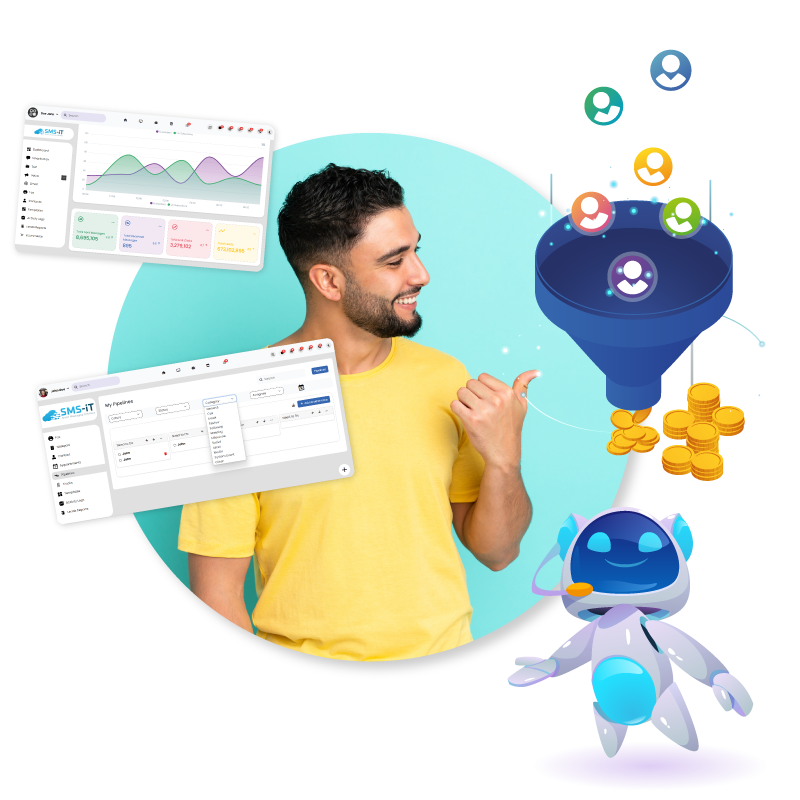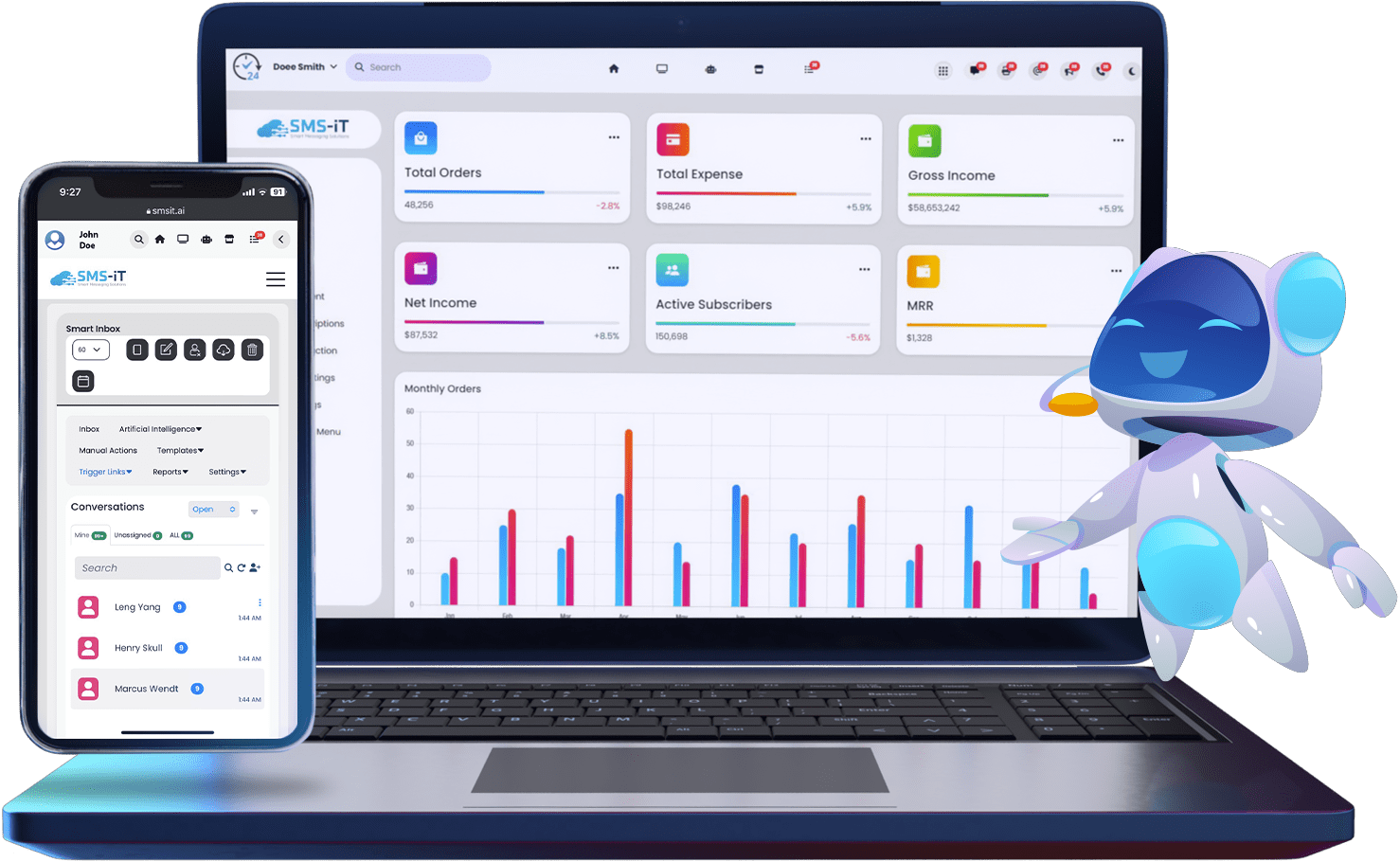Artificial Intelligence Customer Relationship Management (AI CRM) is a technology that combines the power of artificial intelligence and customer relationship management to enhance customer engagement and improve the overall customer experience. AI CRM uses machine learning algorithms to analyze customer data and provide personalized recommendations and solutions. In today’s highly competitive business landscape, AI CRM has become increasingly important for businesses to stay ahead of the curve and meet the evolving needs of their customers.
Key Takeaways
- Artificial Intelligence CRM is a technology that uses machine learning and natural language processing to automate customer relationship management.
- SMS-iT CRM is a popular AI CRM tool that helps businesses manage customer interactions through omnichannel messaging, calls, and video conferencing, including Text (SMS, MMS, and RCS), Social Network DMs, Voice Broadcasts, Voice Calls, Email, Fax, and Video Conferencing with lead capture technology.
- AI CRM improves customer engagement by providing personalized and timely responses to customer inquiries and feedback.
- AI CRM enhances customer experience by streamlining processes, reducing response times, and providing relevant recommendations.
- AI CRM can benefit small businesses by improving customer satisfaction, increasing sales, and reducing operational costs.
Understanding SMS-iT CRM: A Brief Overview
SMS-iT CRM is a specific type of AI CRM that focuses on integrating omnichannel marketing with customer relationship management. It allows businesses to leverage the power of omnichannel messaging and calling to engage with their customers in a more personalized and efficient manner. With SMS-iT CRM, businesses can automate their omnichannel marketing campaigns, send targeted messages based on customer preferences, make calls with power dialers and multi-line dialers, do video conferencing with lead capture, and track the effectiveness of their campaigns in real-time all powered with Artificial Intelligence.
The features and benefits of SMS-iT CRM are numerous. Firstly, it allows businesses to send personalized omnichannel messages to their customers, which helps in building stronger relationships and increasing customer loyalty. Secondly, it enables businesses to automate their omnichannel marketing campaigns, saving time and resources. Thirdly, it provides businesses with valuable insights into customer behavior and preferences through data analytics, allowing them to make informed decisions and improve their marketing strategies.
The Impact of AI CRM on Customer Engagement
AI CRM has a significant impact on customer engagement by providing businesses with the tools and insights they need to better understand their customers and deliver personalized experiences. By analyzing customer data, AI CRM can identify patterns and trends in customer behavior, allowing businesses to tailor their marketing messages and offers accordingly.
One example of successful AI CRM implementation is Amazon’s recommendation engine. By analyzing customer browsing and purchase history, Amazon is able to provide personalized product recommendations to its customers, increasing the likelihood of a purchase. This not only enhances the customer’s shopping experience but also increases customer loyalty and satisfaction.
Another example is Netflix, which uses AI CRM to recommend personalized movie and TV show suggestions to its users. By analyzing user viewing history and preferences, Netflix is able to provide a curated list of content that is likely to be of interest to each individual user. This not only keeps customers engaged with the platform but also increases customer satisfaction and retention.
How AI CRM Improves Customer Experience
AI CRM improves the customer experience by personalizing and customizing interactions with customers. By analyzing customer data, AI CRM can identify individual preferences and tailor marketing messages and offers accordingly. This not only makes customers feel valued but also increases the likelihood of a purchase.
Furthermore, AI CRM streamlines customer service processes by automating routine tasks and providing self-service options. For example, AI-powered chatbots can handle basic customer inquiries and provide instant responses, freeing up customer service representatives to focus on more complex issues. This not only improves response times but also increases customer satisfaction.
The Role of AI in Small Business CRM
AI CRM has numerous advantages for small businesses. Firstly, it levels the playing field by providing small businesses with access to advanced technology that was previously only available to larger corporations. This allows small businesses to compete on a more equal footing and provide personalized experiences to their customers.
Secondly, AI CRM helps small businesses improve efficiency and productivity by automating routine tasks and providing valuable insights into customer behavior. This allows small businesses to focus their resources on more strategic initiatives and make informed decisions based on data.
Integrating AI CRM with Omnichannel Marketing

Integrating AI CRM with omnichannel marketing has several benefits for businesses. Firstly, it allows businesses to send personalized omnichannel messages to their customers, increasing the likelihood of engagement and conversion. For example, a clothing retailer can send targeted SMS messages with personalized offers based on a customer’s browsing or purchase history.
Secondly, integrating AI CRM with omnichannel marketing enables businesses to automate their omnichannel campaigns, saving time and resources. For example, a restaurant can set up automated SMS, MMS, RCS, Email, Voice, Fax, or Social Network reminders for customers who have made a reservation, reducing the likelihood of no-shows.
Benefits of AI CRM for Small Businesses
Implementing AI CRM can bring several benefits to small businesses. Firstly, it increases efficiency and productivity by automating routine tasks and providing valuable insights into customer behavior. This allows small businesses to focus their resources on more strategic initiatives and make informed decisions based on data.
Secondly, AI CRM improves customer satisfaction and loyalty by providing personalized experiences and timely communication. By analyzing customer data, AI CRM can identify individual preferences and tailor marketing messages and offers accordingly. This not only makes customers feel valued but also increases the likelihood of repeat purchases.
Challenges of Implementing AI CRM for Small Businesses
Implementing AI CRM can pose challenges for small businesses, primarily due to cost and resource constraints. AI CRM requires investment in technology infrastructure, data analytics tools, and employee training. Small businesses with limited budgets may find it difficult to allocate resources for these purposes.
Resistance to change and adoption can also be a challenge when implementing AI CRM. Employees may be resistant to new technologies or processes, fearing job displacement or increased workload. It is important for small businesses to provide proper training and support to employees during the implementation process to ensure a smooth transition.
Best Practices for Leveraging AI CRM for Customer Engagement
To leverage AI CRM for customer engagement, small businesses should focus on identifying customer needs and preferences. By analyzing customer data, small businesses can gain insights into customer behavior and tailor their marketing messages and offers accordingly. This not only increases the likelihood of engagement but also improves customer satisfaction.
Furthermore, small businesses should provide personalized and timely communication to their customers. By using AI CRM to automate routine tasks and provide self-service options, small businesses can ensure that customers receive prompt responses to their inquiries and have a positive experience with the brand.
The Future of AI CRM for Small Businesses
The future of AI CRM for small businesses looks promising, with emerging trends and technologies that will further enhance customer engagement and improve the overall customer experience. One such trend is the use of natural language processing (NLP) and sentiment analysis to analyze customer feedback and sentiment. This will allow small businesses to gain deeper insights into customer preferences and tailor their marketing messages and offers accordingly.
Another emerging technology is the use of chatbots and virtual assistants to provide personalized customer service. By using AI-powered chatbots, small businesses can provide instant responses to customer inquiries and resolve issues in real-time, improving response times and increasing customer satisfaction.
In conclusion, AI CRM is a powerful tool that can greatly enhance customer engagement and improve the overall customer experience. By leveraging the power of artificial intelligence and customer relationship management, businesses can provide personalized experiences, streamline customer service processes, and gain valuable insights into customer behavior. Small businesses can benefit greatly from implementing AI CRM, as it levels the playing field and provides access to advanced technology that was previously only available to larger corporations. By integrating AI CRM with omnichannel marketing, small businesses can further enhance their customer engagement efforts and stay ahead of the curve.
If you’re interested in learning more about how SMS-iT CRM for Small Businesses is revolutionizing customer engagement, you may also want to check out this related article on the SMS-iT blog: “Unlock Your Earning Potential with the SMS-iT Affiliate Program.” This article explores how small businesses can leverage the power of SMS-iT CRM tools to not only enhance customer relationships but also generate additional revenue through their affiliate program. Discover the untapped earning potential that awaits with SMS-iT CRM by reading the full article here.
FAQs
What is Artificial Intelligence CRM?
Artificial Intelligence CRM is a technology that uses machine learning algorithms to analyze customer data and provide insights to businesses. It helps businesses to personalize their customer engagement and improve customer experience.
What is SMS-iT CRM?
SMS-iT CRM is a semi-sentient communication-focused CRM for sales and marketing. It is a customer relationship management software that uses omnichannel communications to engage with customers. It allows businesses to send personalized messages to customers and track their responses.
How does Artificial Intelligence CRM revolutionize customer engagement?
Artificial Intelligence CRM revolutionizes customer engagement by providing businesses with insights into customer behavior and preferences. It helps businesses to personalize their communication with customers and improve customer experience.
How does SMS-iT CRM help small businesses?
SMS-iT CRM helps small businesses to engage with customers in a cost-effective way. It allows businesses to send personalized omnichannel messages to customers and track their responses. It also helps businesses to automate their customer engagement process and save time.
What are the benefits of using Artificial Intelligence CRM?
The benefits of using Artificial Intelligence CRM include improved customer experience, increased customer loyalty, and higher revenue. It also helps businesses to automate their customer engagement process and save time.
What are the benefits of using SMS-iT CRM?
The benefits of using SMS-iT CRM include cost-effectiveness, personalized communication with customers, and improved customer engagement. It also helps businesses to track customer responses and automate their customer engagement process.







